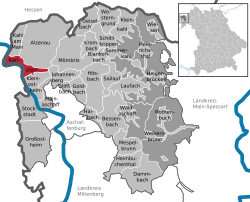Karlstein am Main
| Karlstein am Main | ||
|---|---|---|
|
||
| Coordinates: 50°2′56″N 9°1′6″E / 50.04889°N 9.01833°ECoordinates: 50°2′56″N 9°1′6″E / 50.04889°N 9.01833°E | ||
| Country | Germany | |
| State | Bavaria | |
| Admin. region | Unterfranken | |
| District | Aschaffenburg | |
| Government | ||
| • Mayor | Winfried Bruder | |
| Area | ||
| • Total | 12.68 km2 (4.90 sq mi) | |
| Elevation | 110 m (360 ft) | |
| Population (2015-12-31) | ||
| • Total | 7,968 | |
| • Density | 630/km2 (1,600/sq mi) | |
| Time zone | CET/CEST (UTC+1/+2) | |
| Postal codes | 63791 | |
| Dialling codes | 06188 | |
| Vehicle registration | AB | |
| Website | www.karlstein.de | |
Karlstein am Main (officially Karlstein a.Main) is a municipality in the Aschaffenburg district in the Regierungsbezirk of Lower Franconia (Unterfranken) in Bavaria, Germany.
Karlstein am Main lies on the River Main, and on the railway between Frankfurt am Main and Aschaffenburg, 16 km northwest of Aschaffenburg.
Karlstein’s Ortsteile are Dettingen and Großwelzheim.
The placename Dettingen suggests an Alamannic settlement (3rd to 14th century), and the placename Großwelzheim a Frankish one.
Großwelzheim had its first documentary mention in a donation document from Lorsch Abbey in 772. Then, the village was called Walinesheim. The placename has the —heim ending that was typical for places founded in Frankish times. The name comes from a count named Walah who held sway in the Maingau.
Dettingen had its first documentary mention in a donation document from Emperor Otto II.
During the War of the Austrian Succession a battle took place in the Karlstein area on 27 June 1743, known as the Battle of Dettingen. The so-called "Pragmatic Army", made up of 35,000 Britons, Hanoverians and Austrians found itself fighting a 70,000-strong French army. The Pragmatic Army overcame the French, thus giving rise to the legend of the "Wandering Englishman", which has been handed down in Dettingen to this day. The Battle of Dettingen marked the last time a British monarch, King George II, personally led his troops into battle. George Frideric Handel wrote the Dettingen Te Deum in honour of the British victory, which was first performed on 27 November 1743 – exactly five months after the battle began – in George II’s presence.
...
Wikipedia



